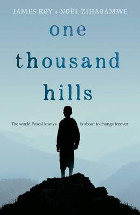One thousand hills by James Roy and Noel Zihabamwe

Scholastic (Omnibus) 2016. ISBN 9781762990750 (Age: 15+) Highly recommended. Rwanda, Civil war. Beginning with a talk with a counsellor at his school in Belgium, a young man, at first resentful and wary, tells his story. The counsellor leads him gently into understanding that he needs to tell his story as it may explain his current unacceptable behaviour. The counsellor carefully leads the non committal Pascal into telling him about his family and then school, and church, drawing out the next part of his story, the shocking tale of a boy trying to keep alive. April, 1994, saw the first sequence of events which resulted in an horrific group of years in Rwanda when genocide wiped out eight hundred thousand people in one hundred days. This book is not for the casual reader: it is a deeply moving expose of one boy's involvement in that first day of killing, exceeding anything we are likely to hear about. I read it within two days, wanting to know how it happened, wanting to know how this young man escaped the horror and was able to rebuild his life in Australia, but at the same time, I walked the house, putting the book aside and taking on any other task to break the emotional drain of reading it. It is a tale simply told. Pascal is about eleven when it all happened, and he tells of his life with his family in a small village: we hear of the daily life, school, chores at home, Sunday at church, the friends and local shop. All the while small incidents occur which alert the reader to what is beginning to happen: we are aware of tension developing in the community as machetes appear, neighbours move away, the word 'cockroach' becomes widely used to mean something other than the house bug, the Tutsi people, and their teacher cries inexplicably, sending the children home early, while the radio broadcasts are so full of hate that his parents turn it off. Violence erupts once the president is killed, and Pascal and his siblings are told to stay at home. His parents are fearful, but when Pascal's brother sneaks out, Pascal offers to go and fetch him back. Returning alone he sees piles of bodies along the road and his neighbours exhort him to return home quickly. Once home he finds his sister alone and his parents missing. They shelter in an old tank and when he hears the church bells, moves stealthily to the church for sanctuary, avoiding the men in trucks, and pacifying his sister. There he is sent away by his friend, the priest and looking back sees men with machetes close the doors on the thousand people inside. Pascal finds his sister and together they flee Rwanda, living in a refugee camp for ten years before he comes to Australia. This story is harrowing to read but equally hard to put down. Through the eyes of an innocent young boy, we see images that no child should see. In this way it has similarities to The boy in the striped pyjamas (John Boyne) and Morris Gleitzman's Once series about Felix a young Jewish boy surviving during Nazi Germany. James Roy hopes that the book will serve to create some understanding of past events to ensure that it never happens again. And although I agree with him wholeheartedly, it seems that people have not heeded the lessons of history. And this will create a whole box of discussion points with students. Fran Knight